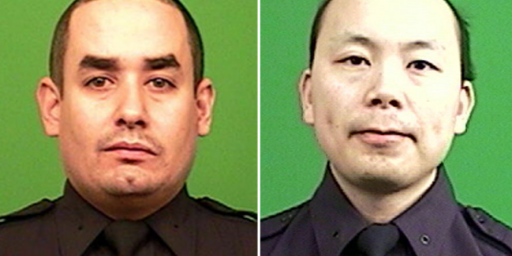Man With Parkinson’s Arrested For Not Appearing To Enjoy Olympic Event
Lowering The Bar passes along a rather appalling story from Merry Olde England:
A man with Parkinson’s disease who was arrested during the Olympic men’s cycling road race while sitting beside the route has said he wants a “letter of exoneration” from Surrey police, claiming their treatment of him was disproportionate.
Mark Worsfold, 54, a former soldier and martial arts instructor, was arrested on 28 July for a breach of the peace shortly before the cyclists arrived in Redhouse Park, Leatherhead, where he had sat down on a wall to watch the race. Officers from Surrey police restrained and handcuffed him and took him to Reigate police station, saying his behaviour had “caused concern”.
“The man was positioned close to a small group of protesters and based on his manner, his state of dress and his proximity to the course, officers made an arrest to prevent a possible breach of the peace,” Surrey police said in a statement.
Worsfold, whose experience was first reported by Private Eye, claims police questioned him about his demeanour and why he had not been seen to be visibly enjoying the event. Worsfold, who was diagnosed with Parkinson’s in 2010, suffers from muscle rigidity that affects his face. He was released after two hours without charge or caution.
“It could have been done better. I was arrested for not smiling. I have Parkinson’s,” he said, adding that he realised the officers were working long hours and trying to control the event properly, but they had not, in his case, acted correctly. He said he did not want to make further comment until he received a response from Surrey police.
Worsfold, who teaches martial arts in Leatherhead, climbed Mount Kilimanjaro last February for the Save the Rhino charity.
Surrey police said: “There were a number of factors which led officers to make this arrest, including the fact that the race was rapidly approaching, the heightened level of security due to the high-profile nature of the event and the sheer number of spectators in attendance. These were fully explained to the individual concerned. He was given words of advice and released with no further action.”
LTB comments:
Granted, police have a difficult job and have to make snap decisions sometimes. No argument there. But how does a snap decision then result in an arrest and two-hour detention of someone who, presumably, said something like “I look like this because I have Parkinson’s” if they gave him a chance to explain at all? And in this case, the decision took at least two officers away from the race they were supposed to be guarding, so security actually got worse.
In the U.S., this would violate the Fourth Amendment because, although the officers may have had enough articulable suspicion for a Terry stop, I don’t see any facts suggesting they had cause to arrest him. Police did say that Worsfold had “a number of knives” in his possession, but they turned out to be rubber display knives. That’s weird, but weird isn’t probable cause. The Fourth Amendment doesn’t apply in the U.K., as I hope most of you know, and sadly it is on life support over here.
Indeed, on all counts







“officers made an arrest to prevent a possible breach of the peace”
What is this? Minority Report? Office of Precrime? I don’t think that turned out very well.
If I remember right, the standard for an arrest in the UK is “reasonable grounds ” that you have committed or will commit a crime – is that a lower standard than probable cause?
Meh. Seems like much ado about not too much.
@Tsar Nicholas: Only because it didn’t happen to you, TN.
This article refers to Surrey Police doing things… I thought the original billet for Olympic security was bid out to G4S, who screwed their personnel management so badly they had to get the UK gov’t to pony up Army troops to fill the holes. Anybody here from the far side of the Atlantic have better info?
@Tsar Nicholas:
Someone call the cops! Tsar doesn’t appear to be enjoying this blog!
i thought this was from “the onion”?!
Smile, darn ya, smile!
What happens if you grimace in the U.K.? Do they reinstate the Death Penalty?
ask.london2012.com/
surrey.police.uk/contact-us
Did anyone else look at this story and ask what the hell a Parkinson’s sufferer is doing teaching self-defense? Sorry, but that just doesn’t make sense to me.
@Jenos Idanian #13: No, it depends on the timing and whether the term “former” modifies “soldier” only or “martial arts instructor” as well. It’s quite possible he used to be both and then developed Parkinsons.
I’m not so worried by the initial arrest as by the amount of time it took to release him. However, given the amount of stuff that the police were probably having to handle, they might have realized very quickly that the guy wasn’t a problem, which means at that point the whole affair got shoved off to the back burner and no one bothered to finish processing the guy’s release until they realized “oh, yeah, we’ve still got that martial arts guy in Holding Pen 2.” It happens….
@Jenos Idanian #13: Actually, reading that again, the article states that the guy is presently acting as a martial arts instructor. Yeah, that seems weird.
@Jenos Idanian #13: @grumpy realist: Oh good lord. The man’s Parkinson’s may not yet be so debilitating that it keeps him from conducting martial arts instruction. Parkinson’s is a gradual disease.